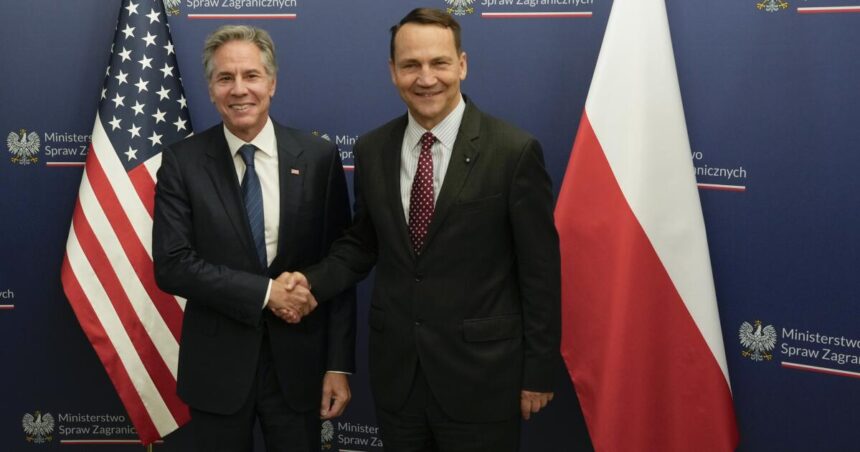U.S. Secretary of State Antony J. Blinken wrapped up a three-nation European tour in Poland on Thursday that focused on Ukraine, following repeated calls from Ukrainian officials to use Western-supplied weapons for long-range strikes inside Russia.
Blinken spent a day in Kiev with British Foreign Secretary David Lammy and pledged to convey Ukraine’s demands to world leaders before flying to Warsaw.
President Biden and British Prime Minister Keir Starmer are due to meet in the United States on Friday, and there are signs that both governments are open to allowing Ukrainian forces to use the weapons to strike targets further inside Russia than previously authorized.
“As Russian behavior has changed and the battlefield has changed, we have adapted,” Blinken said at a news conference in Warsaw.
Biden has allowed Ukraine to fire U.S.-supplied missiles across the border into Russia in self-defense, but has significantly limited how far they can be fired.
Last week, Defense Secretary Lloyd J. Austin met with Ukrainian President Volodymyr Zelenskiy and objected to Kiev’s request for long-range strikes, noting that Ukraine is already capable of striking targets inside Russia with its own home-made systems, including drones.
One of Kiev’s main requests is for attacks by the U.S.-made Army Tactical Missile System (ATACMS). The Pentagon has noted that ATACMS is not a solution to Ukraine’s main threat from Russian long-range glide bombs that can be launched from more than 300 kilometers away, outside the range of ATACMS, Pentagon spokesman Lt. Col. Charlie Dietz said.
Moreover, ATACMS missiles can cost up to $1.5 million apiece, depending on the type, and the U.S. supply is “limited,” Dietz said. “We have to be careful about when and where we deploy them.”
Speaking at Ramstein Air Base in Germany last week, Austin said the arguments Ukraine used for long-range strikes were similar to talks the U.S. had with Ukraine over Abrams tanks, which it eventually provided but which are no longer in service.
“I don’t think any particular capability is going to be decisive. That comment remains the same,” Austin said.
Pentagon spokesman Pat Ryder, who visited the Pentagon on Thursday, would not say whether Defense Secretary Austin’s position had changed since last week.
“At this point, the policy hasn’t changed and we will keep it that way,” Ryder said.
“One of the goals of my visit to Kyiv yesterday was to hear from our Ukrainian partners what they see as needed now to address the current battlefield, including in eastern Ukraine and other parts of the country,” Blinken said in Warsaw.
“We will continue to do exactly what we have been doing: adjusting as needed to defend against Russian aggression,” Blinken said.
He delivered a similar message in Kiev the day before, and in both cases the language was similar to that he used in May, just before the United States authorized Ukraine to use U.S. military weapons on Russian territory.
The diplomatic visit comes as Russia’s larger and better-equipped military forces close in on Ukraine’s eastern Donetsk region and are bombing cities across the country with missiles, glide bombs and drones, causing heavy civilian casualties.
Poland, a NATO member that borders Ukraine, has supported Ukraine and Blinken heard a request from Polish Foreign Minister Radek Sikorski to ease arms restrictions.
Sikorsky argued that Ukraine should be allowed to use Western weapons against Russia in self-defense because “Russia is committing war crimes by attacking civilians.”
“These missiles attacking civilians were launched from bombers flying over Russian territory. These bombers take off from airfields on Russian territory,” Sikorsky said. “Victims of aggression have the right to self-defense.”
“Therefore, I believe that Ukraine has the right to use Western weapons to prevent war crimes,” Sikorsky added.
In Warsaw, Blinken also met with President Andrzej Duda and Prime Minister Donald Tusk, who share Sikorski’s position on the issue.
On Wednesday, Blinken and Lamy announced that the United States and Britain had pledged about $1.5 billion in additional aid to Ukraine during their visits to Kyiv. Blinken announced more than $700 million in humanitarian aid, while Lamy confirmed his country would provide $782 million in new aid and loan guarantees.
Many of the efforts were aimed at shoring up Ukraine’s power grid, which has come under repeated attack from Russia ahead of a harsh winter expected in the country.
Ukraine’s wish list is long and includes non-military assistance, but Ukrainian officials have made it clear that their most important request is for Western countries to relax restrictions on the use of weapons. Air raid sirens sounded multiple times during the visit, causing delays for diplomats and forcing the cancellation of a wreath-laying ceremony.
Blinken said he would “bring back to Washington” his discussions with Zelensky over the missiles and report back to the president, and that Biden and Starmer would “certainly” discuss the issue when they meet in Washington.
Relations between Ukraine and the West have become increasingly strained after Kiev has repeatedly asked the West for permission to use long-range weapons from the United States and other allies to attack targets deeper inside Russian territory.
The issue has taken on added urgency following reports that Russia recently acquired ballistic missiles from Iran, but Western leaders have so far resisted Ukraine’s request, fearing that if approved it could escalate the conflict.
Zelenskiy has said he has a victory plan that includes several components, including goals Ukraine wants to achieve on the battlefield as well as diplomatic and economic objectives.
In late August, he said Russia’s invasion of Ukraine’s Kursk region was part of a plan to remove the Russian threat from Ukraine’s Kharkiv, Sumy, and Chernihiv regions. He said he hopes to present the plan to both Vice President-elect Kamala Harris and former President Trump in September.
“Let’s hope for at least some strong decisions,” Zelensky said on Wednesday. “For us, it’s very important.”
Lee is a Writer for Associated Press. Associated Press writers Vanessa Guerra in Warsaw and Tara Kopp in Washington contributed to this report.









